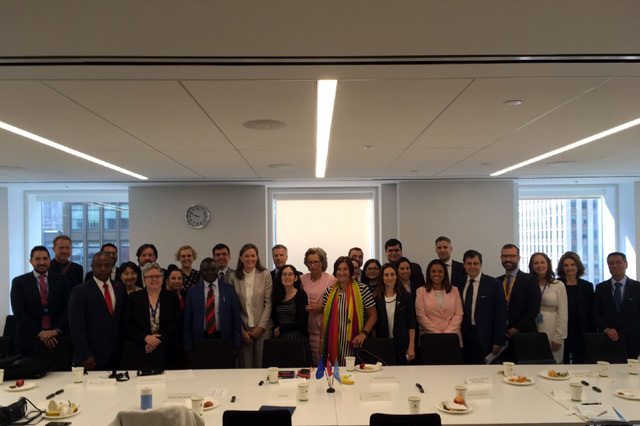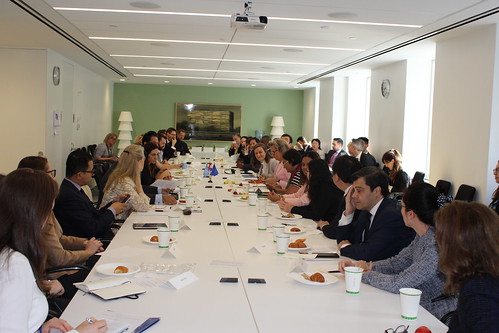
New York NY – In the context of Parliamentarians for Global Action’s Board biannual meetings to monitor and assess the impact of the organization’s programmatic Campaigns, on June 8, PGA Board members met for the first time with the United Nations LGBTI Core Group (at Deputy Permanent Representative level) to learn more about the work done within the UN framework to ensure universal respect for the human rights and fundamental freedoms for all, specifically lesbian, gay bisexual, transgender and intersex (LGBTI) persons, with a particular focus on protection from violence and discrimination, and to exchange views on ways to reinforce each other’s objectives.
Ambassadors Alejandro Verdier, DPR from Argentina, and Lise Gregoire-van Haaren, DPR from the Netherlands, co-chairs of the Core Group, moderated the meeting in which Members of Parliament, PGA Board members, from Argentina, Austria, Chile, Dominican Republic, Guinea-Bissau, the European Parliament (Germany), Mozambique and Sweden participated in an interactive dialogue with representatives from Australia, Brazil, Colombia, El Salvador, France, Germany, Israel, Italy, Japan, Montenegro, Mexico, New Zealand, Norway, Spain, Uruguay, and the European Union, as well as from the non-governmental organization Outright Action International.
Amb. Verdier noted the complementarity of both platforms and the importance of strengthening joint work. He highlighted the role of parliamentarians and diplomats on moving forward the agenda of LGBTI rights.
H.E. Ambassador Rubén Escalante Hasbún, Permanent Representative of El Salvador to the United Nations, invited parliamentarians to support the LGBTI Core Group through UN Resolutions on this topic and the effective mandate of the Independent Expert on Sexual Orientation and Gender Identity (SOGI). He added the significance of expanding the membership of the Core Group to countries from Africa and Asia and concluded by underscoring that parliamentarians have a key role of domesticating the human rights agenda in their countries.
Ms. Margareta Cederfelt, MP from Sweden and PGA’s President, expressed her appreciation to the Mission of the Netherlands for hosting the meeting and to all representatives from the UN LGBTI Core Group for their vital role in raising awareness about, and mobilizing support for, LGBTI rights at the United Nations. She highlighted that to PGA, equality and inclusion of LGBTI rights are human rights and are an integral part of the human rights agenda of the organization.
Ms. Petra Bayr, MP from Austria and PGA’s Treasurer, gave an overview of PGA’s “Campaign Against Discrimination based on Sexual Orientation and Gender Identity (SOGI)” (SOGI Campaign) since its launch in 2013 and highlighted how MPs, PGA members, have taken concrete actions to advance equality and inclusion in their countries. She mentioned, for example, the cases of Chile’s Gender Identity Bill, El Salvador’s incorporation of SOGIE as protected categories under hate crime statutes, Mozambique’s decriminalization of same-sex consensual conduct, and Pakistan’s adoption of a Transgender Rights Bill.
Ms. Bayr concluded by proposing to PGA Board members to approach their Foreign Ministers to advocate for a more active participation on SOGI issues at the international sphere by, for example, backing resolutions advancing equality and inclusion, supporting the mandate of the UN Independent Expert on SOGI, and joining the UN LGBT Core Group and the Equal Rights Coalition. SOGI program staff will follow up with each country on this proposal as well as on the upcoming UN Resolution on Extrajudicial Killings.
Siri May, United Nations Program Coordinator of OutRight Action International, expressed her delight to hear that LGBTI rights are a basic value to PGA and to learn about this work in the context of Pride Month as a way to raise the visibility and resilience of LGBTI persons. She noted that over 70 countries still criminalize same-sex consensual conduct and 40 countries have specific discriminatory statutes that target relations between women. She underscored issues like violence, extrajudicial killings and homelessness of LGBTI youth as priorities in the agenda. Ms. May said that it was important to continue listening to the voices of parliamentarians and to continue the dialogue to achieve global basic rights for the community. She added that to face the rising nationalism, there is a need for a stronger global perspective and defense and promotion of the rules-based international order.
Main points raised during the interactive dialogue:
- Concern about the rise in conservatism in all regions of the world, including an increase of religious/conservative political factions in Parliaments, and effective strategies to defend progress on LGBTI rights and to continue pushing the agenda.
- Role of parliamentarians as champions and leaders in bringing this issue to their constituents and promoting dialogues. Both in establishing a relationship with LGBTI activists and also through bilateral friendship groups or caucuses to strengthen the conversation with governments.
- Synergies, coordination and collaboration with other human rights groups to consolidate and sensitize about common positions.
- Change in social contexts that may produce positive/negative impacts. For example, PGA Board Member Dip. Tucapel Jimenez said that the Chilean Oscar-winning Film “A Fantastic Woman” helped to move the discussion of the Gender Identity Bill in both Chambers, which is expected to be adopted shortly. A decade ago, it would have been unthinkable for the Chilean society to discuss these issues, but there has been a cultural change.
- Significance of the message. For example, PGA Treasurer Ms. Bayr recalled that in the Campaign for Marriage Equality in Ireland, there was an emphasis that Voting Yes did not mean you were taking away rights from anyone. On the contrary, it meant you were expanding rights to everyone else.
- Importance of regional dialogues among parliamentarians and LGBTI activists such as the one held in Buenos Aires, Argentina on May 17-18. PGA Board Member Dip. Carla Pitiot from Argentina shared its results.
Amb. Lise Gregoire-van Haaren, DPR from the Netherlands, concluded by reiterating that this work needs all the voices of parliamentarians and their efforts to build political will and mobilize other colleagues to promote more inclusive legislative and policy frameworks. She thanked all present for the very rich discussion and highlighted that National Parliaments are key to progress.


